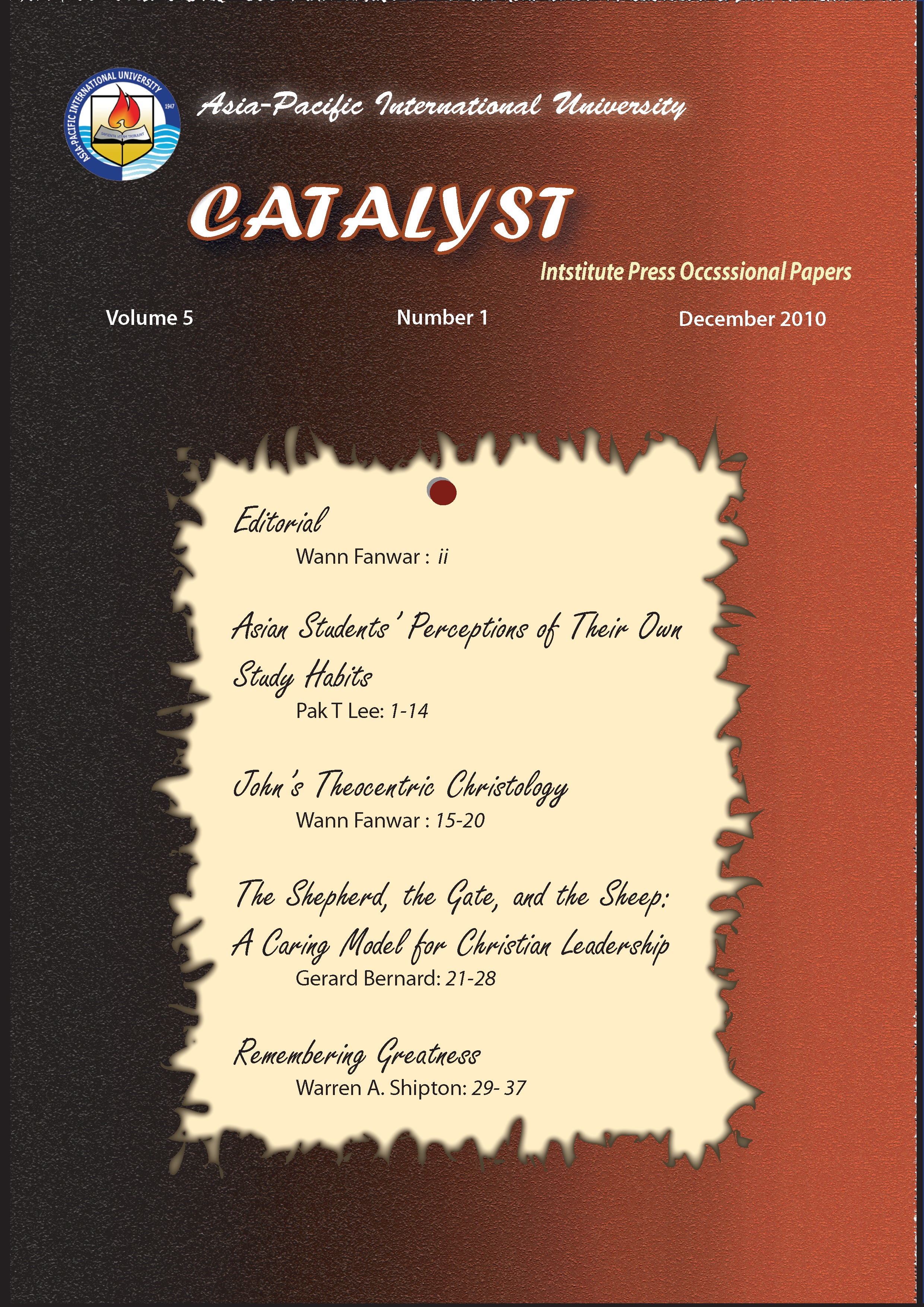Asian Students’ Perceptions of Their Own Study Habits
Main Article Content
Abstract
This research examines the study habits of Asian students studying in a small private Asian university environment. The study attempts to investigate the perceptions of students about their own study habits in eight different areas, which include time management, concentration and memory, note taking, test strategies and test anxiety, organizing and processing information, motivation and attitude, reading and writing. The results suggest that students with higher academic performance are more motivated to learn and are more positive about their own study habits. Higher achievers tend to give themselves higher self-evaluation scores in all the above mentioned areas. There are no significant differences in the perceptions of study habits between higher and lower achievers, except in the area of organizing and information processing.
Article Details

This work is licensed under a Creative Commons Attribution-NonCommercial-NoDerivatives 4.0 International License.
Copyright: Asia-Pacific International University reserve exclusive rights to publish, reproduce and distribute the manuscript and all contents therein.
References
Anonymous (2002). Tools of the trade: the habits of successful students. Retrieved on August 16, 2009 from: http://www.morris.umn.edu/academic/psychology/psy1051/habits.htm
Anonymous (2009). Good study habits and academic achievement. Retrieved on August 16, 2009 from: http://getbettergradesnow.blogspot.com/2209/04/good-study-habits-and-academic.html
Azikiwe, U. (1998). Study approaches of university students. WCCI Region II Forum. Vol. 2. Lagos. P. 106 – 114.
Chan, S.C., Yum, C.K., Fan Y.K., Jegede, O. and Taplin, M. (1999). A comparison of the study habits and preferences of high achieving and low achieving Open University students. Paper presented at the 13th Annual Conference of the Asian Association of Open Universities, Beijing, 14 – 17 October
Crede, M. and Kuncel, N.R. (2008). Study habits, skills, and attitudes: the third pillar supporting collegiate academic performance. Perspectives on Psychological Science, Vol. 3, Number 6, pp 425-453
De Escobar V.M. (n.d.). Good study habits for college students. Retrieved on July 14, 2009 from: http://ezinearticles.com/?Good-Study-Habits-For-College-Students&id=2231413
Diekhoff, G., & Dansereau, D. (1982). A prose learning strategy training program based on network and depth of processing models. Journal of Experimental Education, 50, 180 – 188. Cited in Jones, C. H. and Harlan E. J. (1995). Study skills of students at a post-secondary vocational-technical institute. Journal of Industrial Teacher Education. Vol. 35, Number 2. Retrieved on April 14, 2005 from: http://scholar.lib.vt.edu/journals/JITE/v35n2/slate.html
Fielden, K. (2004). Evaluating critical reflection for postgraduate students in computing. Informing Science and Information Technology Education Joint Conference, 2005, Flagstaff, Arizona. www.informingscience.org/proceedings/InSITE2005/138f36Field.pdf
Igun, S.E., Adogbeji, O. B. (2007). Study habits of postgraduate students in selected Nigerian universities. Library Philosophy and Practice 2007. Retrieved on June 15, 2009 from: www.webpages.uidaho.edu/~mbolin/igun-adogbeji. htm
Jones, C. H. and Harlan, E. J. (1995). Study skills of students at a post-secondary vocational-technical institute. Journal of Industrial Teacher Education. Vol. 35, Number 2. Retrieved on April 14, 2005 from: http://scholar.lib.vt.edu/journals/JITE/v35n2/slate.html
Khan, S. B. (1975). Structure of academic attitudes and study habits. Educational & Psychological Measurements. Vol. 3, pp 835-842
Lalitha, A.R. (2000). Building good study habits. The Kerala Journal of Education; Research and Extension. Kerala State Council of Educational Research and Training
NAEP (1997). Good study habits and academic performance: findings from the NAEP 1994 US history and geography assessments. Retrieved on August 16, 2009 from: http://nces.edu.gov/pubs97/web931.asp
Nneji, L.M. (2002). Study habits of Nigerian university students. HERDSA Conference. http://www.ecu.edu.au/conferences/herdsa/main/papers/ref/pdf/Nneji.pdf
Padma, M.S. (2007). Research in correlates of achievements a trend report. Retrieved on June 14, 2007 from: http://www.education.nic.in/cd50years/g/Z910J01.htm
Rethansmith (n.d.). Effective study habits for college students 89. Retrieved on August 16, 2009 from: http://hubpages.com/hub/Effective-Study-Habits-for-College-Students
Riaz, A., Kiran, A., and Malik, N. H. (2004). Relationship of study habits with education achievements. International Journal of Agriculture & Biology.
Rohwer, W. (1984). An invitation to the developmental psychology of studying. Applied Developmental Psychology, 1, 74-114.
Sarwar, M., Bashir, M., Khan, M.N., and Khan, M.S. (2009). Study-orientation of high and low academic achievers at secondary level in Pakistan. Educational Research and Review Vol. 4, pp. 204-207.
Seebach, R.W. (2006). Acquiring effective study habits in five easy steps. Retrieved on June 8, 2009 from: http://www.amelox.com/study.htm
Solomon, Larry J. (2002). How to study and succeed in college. Retrieved on March 13, 2009 from: http://solomonsmusic.net/study.htm.
Stark, M.C. (2008). Retention, bonding, and academic achievements: effectiveness of the college’s seminar in promoting college success. Ninth Annual National Conference on Retention, New York
TeBeest, K.G. (2000). Developing good study habits. Retrieved on August 16, 2009 from: http://www.paws.kettering.edu/~ktebeest/courses/study.pdf
The Open University of Hongkong (1999). High achievers versus low achievers. OPENLINK, July 1999, Vol 8, Issue 3. Retrieved on September 9, 2009 from: http://www.ouhk.edu.hk/~openlink/current/9907/e-resdl.htm
University of Houston (n.d.). Study Skills Assessment Questionnaire. Retrieved on February 12, 2009 from http://prtl. uhcl.edu/portal/page/portal/COS/Self_Help_and_Handouts/STUDY_SKILLS_QUESTIONNAIRE


